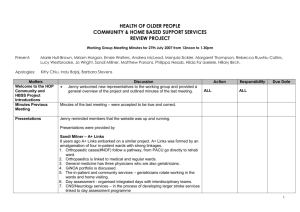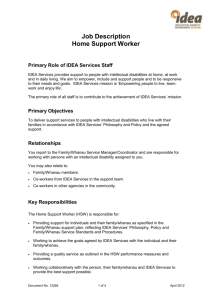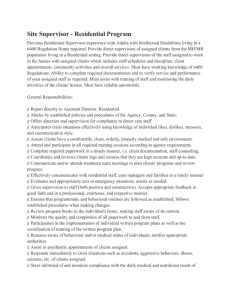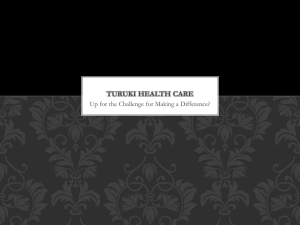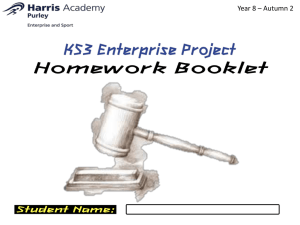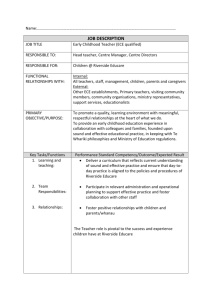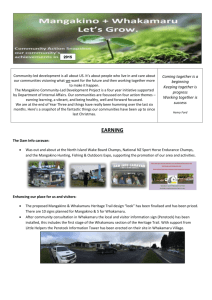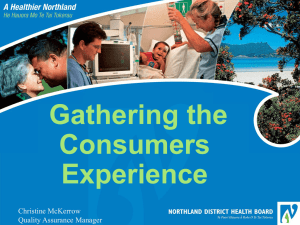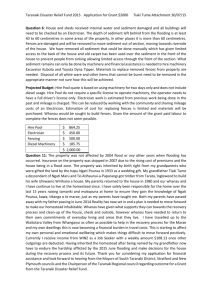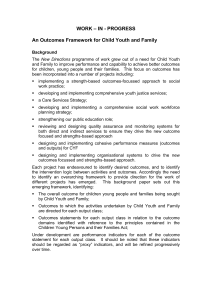Purpose of position: To provide a specialist 24/7 Residential Support
advertisement
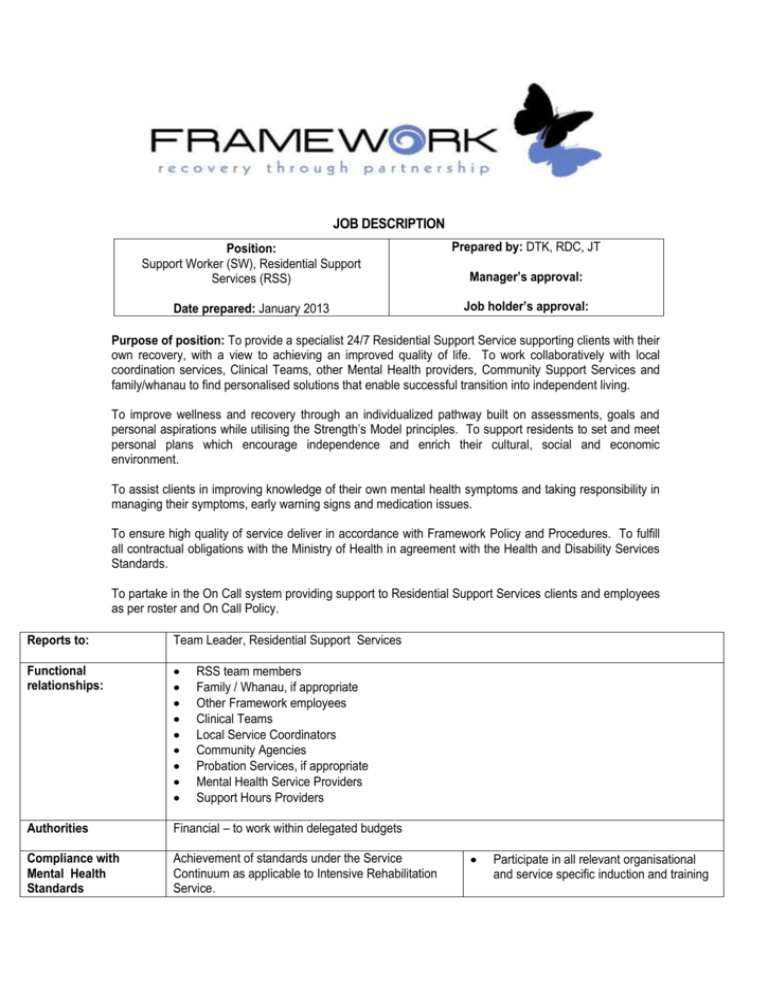
JOB DESCRIPTION Position: Support Worker (SW), Residential Support Services (RSS) Prepared by: DTK, RDC, JT Date prepared: January 2013 Job holder’s approval: Manager’s approval: Purpose of position: To provide a specialist 24/7 Residential Support Service supporting clients with their own recovery, with a view to achieving an improved quality of life. To work collaboratively with local coordination services, Clinical Teams, other Mental Health providers, Community Support Services and family/whanau to find personalised solutions that enable successful transition into independent living. To improve wellness and recovery through an individualized pathway built on assessments, goals and personal aspirations while utilising the Strength’s Model principles. To support residents to set and meet personal plans which encourage independence and enrich their cultural, social and economic environment. To assist clients in improving knowledge of their own mental health symptoms and taking responsibility in managing their symptoms, early warning signs and medication issues. To ensure high quality of service deliver in accordance with Framework Policy and Procedures. To fulfill all contractual obligations with the Ministry of Health in agreement with the Health and Disability Services Standards. To partake in the On Call system providing support to Residential Support Services clients and employees as per roster and On Call Policy. Reports to: Team Leader, Residential Support Services Functional relationships: Authorities Financial – to work within delegated budgets Compliance with Mental Health Standards Achievement of standards under the Service Continuum as applicable to Intensive Rehabilitation Service. RSS team members Family / Whanau, if appropriate Other Framework employees Clinical Teams Local Service Coordinators Community Agencies Probation Services, if appropriate Mental Health Service Providers Support Hours Providers Participate in all relevant organisational and service specific induction and training Facilitate service user integration into the community Compliance identified in regular supervision sessions and annual performance reviews. Every client has a completed Strength Assessment & Personal Plans which are regularly reviewed to ensure implementation and progress. (Needs Assessment Standards are set by the MOH). The SW supports the service user towards growth and development in the fulfillment of individual goals and objectives identified by the service user. The SW assists and encourages the client to establish community supports external of Framework. Community supports are identified and utilised. The SW ensures the client has support and advocacy with social issues, working alongside WINZ and other financial institutions. Client acknowledgement of increased self reliance and confidence in the handling of their financial situation. The SW establishes relationships and liaises with clinical services and other professionals involved in the clients care. Client receives continuity of treatment throughout their recovery process. Support service user’s recovery and care using the full range of assessment and development tools RSS Assessment process ensures that the resident’s rehabilitation process is on-going and attempts to identify, develop and meet the client’s strengths, needs and aspirations. Tools to be used are: 1. Initial Plan RR-31 2. Initial Assessments RR-33 3. Strengths Assessment (Life Data) 4. Personal Plan (Life Data) 5. Client Risk Assessment RR-008 6. My Early Warning Signs (MEWS) and Wellness Plan RR-25 Client successfully transfers to community placement. Every client has the appropriate completed assessment tools and recovery plans. Assessments and plans are regularly reviewed. Client’s progress is recorded during clinical reviews. Ongoing family/whanau involvement and support through client’s recovery. This is clearly defined and evaluated through: Residential Support Services Pathway. Strength Assessments & Personal Plans Supervision of SW 7. Clinical Reviews RR-003 Ensuring adequate clinical support for client. Clinical involvement is organised and supported from the point of referral for the service user and is an ongoing professional relationship. Regular meetings and interactions with clinical service and/or identified clinicians as required. Liaison with Pharmacy. The clinical team is an integral part of the transfer of care meeting, clinical review meetings, and regular individualised meetings with clients. SW to receive training in mental health issues and medications. SW has a sound knowledge of mental health definitions, symptoms, early warning signs and Medication Policy and Procedures to be followed at all times. medication issues including side effects. Maintaining Resident’s wellness. All clients have an up to date Risk Assessment and hazard notation if required, for conditions such as allergic responses, adverse drug reactions, suicide risk and infection risks. This is prominently displayed in the client file and medication chart. MEWS and Wellness Plan is completed by the client and Support Worker to identify actions to be taken when client is unwell. This will be agreed with the Clinical Team. Family/whanau support will be utilised if identified as a support by client. On-going improvement in the client’s relationships with people in his/her direct environment. Facilitate a healthy and comfortable living environment for residents. Framework endeavors to ensure all supports are exhausted before an inpatient admission is required. Clients are given the option of having family/whanau involved in their care. All medication documentation to be completed and updated when necessary. Review of MEWS plans and client risk assessment. Awareness of early warning signs for each resident communicated to all employees and documented in client files. Early intervention, observation, and demonstration of knowledge in order to provide quick and appropriate solutions/actions. Follow Policies and Procedures for family/whanau participation that encourages the appropriate involvement in the service of clients’ families/whanau. The responsiveness of the SW to the needs of clients and their families is enhanced through the involvement of clients’ families in the planning, implementation and evaluation of services, where identified as appropriate by the client. The SW undertakes activities to encourage families to provide feedback and contribute to the collective views. The SW supports the establishment and maintenance of positive relationships in the community. Levels of family/whanau involvement are established by the client at the time of them entering the service. Client has the right to change the amount of family/whanau participation in their care at any time. Participate in compulsory in service training. The SW is able to act as a role model and lead by example in activities of daily living. SW will assist clients with; Daily chores and maintaining cleanliness standards Menu planning, shopping and advising on healthy eating Preparation & Cooking of meals Personal hygiene issues Appropriate dress Physical health Assist is defined as active participation SW will be expected to participate in daily rostered chores to maintain a healthy and comfortable living and working environment. Rostered chores signed Coaching, assisting and working along side residents to ensure pride is taken in their home and environment. Resident’s motivation and willingness to participate in household duties and the level to which these are carried out. In service induction training signed off by Team Leader. Support, monitor and maintain successful completion of daily ‘chores’ lists by completing sign off. SW takes full responsibility of house cleanliness and hygiene standards. Detailed role description is available. Quality of residents personal hygiene and dress standard improved where required, documented in support plans. General standard and maintenance of resident’s physical health. Linen and household items inventories completed when required. Documentation Health and Safety Policy and Procedures adhered to ensuring a safe environment for both clients and employees. SW follow guidelines for managing client records that include: Using only symbols and abbreviations that are organisationally recognised within Framework Attendance at Framework Health and Safety meetings if required. Entering all information required into the Residential Support Service electronic database and Lifedata computer system. Maintaining a standardised format so that information can be easily found All files audited on a regular basis by the Best Practice Leader and Team Leader Ensuring all information and records are completed in a timely manner Receiving and authenticating verbal orders, as applicable An ‘alert’ notation for conditions such as allergic responses, adverse drug reactions and infection risks is prominently displayed in the record. All documentation completed as per organisational and National Mental Health Standards. Documentation monitored in regular supervision meetings with the Team Leader Organisational Expectations Health and Safety Complete service induction training. Sign off induction training documentation within 3 weeks of employment commencement. Actively participates in regular one on one sessions. Regular attendance at internal supervision. Actively participates in 6 monthly reviews. Actively participates in annual performance review. Completion of 6 month and Annual Performance Reviews and Development Plan. Observes and role models Framework values, philosophy and beliefs. Can name the values of Framework and discuss what they mean for modeling behaviour, and motivating service users. Understands and follow the policy and procedures of both Framework and service specific policy. Demonstrated by adherence to policy. Participate actively and constructively in team meetings and service development. Attends and contribute to team meetings and other like meetings. Undertakes ongoing personal and professional development and training Evidence of written, completed and implemented personalised Development Plan Operates within the parameters of the Treaty of Waitangi and cultural safety and ensuring the delivery of a culturally safe service. To provide appropriate services to meet the needs of Maori clients and their whanau. Monitor Health and Safety relevant to the needs of Service and which comply with Health and Safety Act 1992 and Amendment May 2003 Compliance with the Health and Safety Act. Specifically in relation to the induction of new employees Ensure your own health and safety and also the health Potential risks are identified and appropriate and safety of other colleagues and/or visitors to our action is taken. premises The above statements are intended to describe the general nature and level of work being performed. They are not intended to be construed as a list of all responsibilities, duties and skills required of the position and the incumbent KEY COMPETENCIES: fully detailed in the Competency Framework Skills: Working with Data and Information Gathering and analysing information Record keeping/documentation Decision making Working with People Managing relationships and networking Team working, coaching and guiding Communicating, influencing and negotiating Working with Service Users Working with Maori Working with Families/Whanau Working within Communities Challenging Stigma and Discrimination Law, Policy and Practice Professional and Personal Development Personal Attributes: Compassionate & Caring: sensitive and empathetic Genuine: warm, friendly, fun, have aroha and a sense of humour Non-judgmental: non-discriminatory Open-minded: culturally aware, self-aware, innovative, creative and positive risk takers Optimistic: positive, encouraging and enthusiastic Patient: tolerant and flexible Professional: accountable, reliable and responsible Resilient Supportive: validating, empowering and accepting Understanding Role-models and upholds key Framework Values: Demonstrating Integrity Valuing Diversity Working Collaboratively Striving for Excellence Communicating Effectively Financial Sustainability Environmental Responsibility Embracing Aroha HR-16 – EMPLOYMENT HAZARDS & CONTROLS All work roles have inherent hazards associated with them. The roles that you will be involved in at Framework are no exception. As an employer, Framework is required by law to manage such hazards. Possible hazards associated with your role are listed in this brochure, together with measures which have been designed to ensure your health and safety. The listed “control” measures include various equipment, processes, policies and/or approved procedures. All employees are expected and required to follow the established controls. In addition to the above, all work areas have processes in place to identify hazards specific to that area. Trained Health and Safety Representatives in your area can assist you with any Health & Safety issue. Role/Task/Position Hazard Outcome VDU users (all employees) Overuse/ergonomics Strain injury Manual and patient handling (all clinical employees) Excess weight Strain Working with public and clients (all clinical employees) Unwell/stressed service users and families Verbal Abuse, violence/aggression Stress Working with public and clients (all clinical employees) Unwell service users Infectious diseases Working with public in the community Isolation/lack of support Poor outcomes, stress, potential injury Driving for work – company vehicles (All employees) Usual traffic hazards Breakdown/injury All Employees Slips and falls Potential Injury All Employees Long hours Lack of training/support Bullying Stress All Employees Machinery/electrical appliances Potential Injury Lack of service All Employees Chemicals (very limited) Exposure/injury AREA OR ROLE SPECIFIC Controls in place to Manage Workstation assessment, equipment and setup VDU Training Manually varying tasks Back Care Training Utilizing appropriate services Attend appropriate training Supervision Utilize team based processes Debriefs Be familiar with procedures for dealing with violence (watches, security, police) Infection control training appropriate to area – local procedures Utilizing protective equipment Vaccination programmes Paid sick leave and return to work programme Community Visits Policy (Health & Safety Manual) Local procedures (e.g. cell phones, access to consultation) Team based reviews, risk management plans EAP (free counselling) regular supervision with manager Current drivers licence Driver Responsibility Vehicle maintenance Insurance/roadside rescue All employees members are required to cleanup a spill or remove an unsafe obstacle Report hazard to Manager or Health & Safety Rep. Report hazards, alert direct manager, attend regular supervision Regular meetings and appropriate training EAP (free counselling) Harassment Policy/Officers Utilising own GP Regular maintenance / checklist Utilizing appropriate support services Report hazard to Manager or Health & Safety Rep Clearly labelled and correctly stored Employees training Accompanying Safety Data Sheet (S.D.S)

